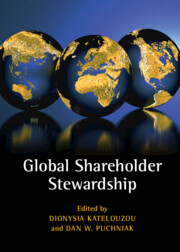Book contents
- Endorsements
- Global Shareholder Stewardship
- Global Shareholder Stewardship
- Copyright page
- Dedication
- Contents
- Figures
- Tables
- Contributors
- Foreword
- Acknowledgements
- Abbreviations
- Part I Foundations
- 1 Global Shareholder Stewardship
- 2 The UK Stewardship Code 2010–2020
- 3 The Market for Stewardship and the Role of the Government
- Part II Jurisdictions
- Part III Comparisons
- Index
1 - Global Shareholder Stewardship
Complexities, Challenges and Possibilities
from Part I - Foundations
Published online by Cambridge University Press: 28 April 2022
- Endorsements
- Global Shareholder Stewardship
- Global Shareholder Stewardship
- Copyright page
- Dedication
- Contents
- Figures
- Tables
- Contributors
- Foreword
- Acknowledgements
- Abbreviations
- Part I Foundations
- 1 Global Shareholder Stewardship
- 2 The UK Stewardship Code 2010–2020
- 3 The Market for Stewardship and the Role of the Government
- Part II Jurisdictions
- Part III Comparisons
- Index
Summary
Within less than twenty years the idea of shareholder stewardship has become a global phenomenon. In 2010, the United Kingdom released the world’s first stewardship code to cure what was perceived to be the UK’s primary corporate governance malady: rationally passive institutional investors in a country characterised by a dispersed ownership structure. Today, UK-style stewardship codes exist in 20 jurisdictions, on 6 continents, and are embedded in a panoply of legal systems, shareholder markets, and corporate cultures. This introductory Chapter to the Global Shareholder Stewardship edited book explains why shareholder stewardship around the world is far more complex than the existing literature suggests and how this complexity impacts current theories and existing practices. To explain complexity, the Chapter provides a loose taxonomy of global shareholder stewardship and examines stewardship from multiple perspectives. This complexity, which has largely been overlooked in the literature, creates distinct varieties of stewardship. Based on the distinct varieties of stewardship in jurisdictions around the world, this Chapter concludes by illuminating the challenges and possibilities of global shareholder stewardship. The taxonomy also serves as a useful lens for observing the common themes and points of intersection that make the whole of this Book greater than the sum of its individual Chapters.
Keywords
- Type
- Chapter
- Information
- Global Shareholder Stewardship , pp. 3 - 43Publisher: Cambridge University PressPrint publication year: 2022
- 4
- Cited by

